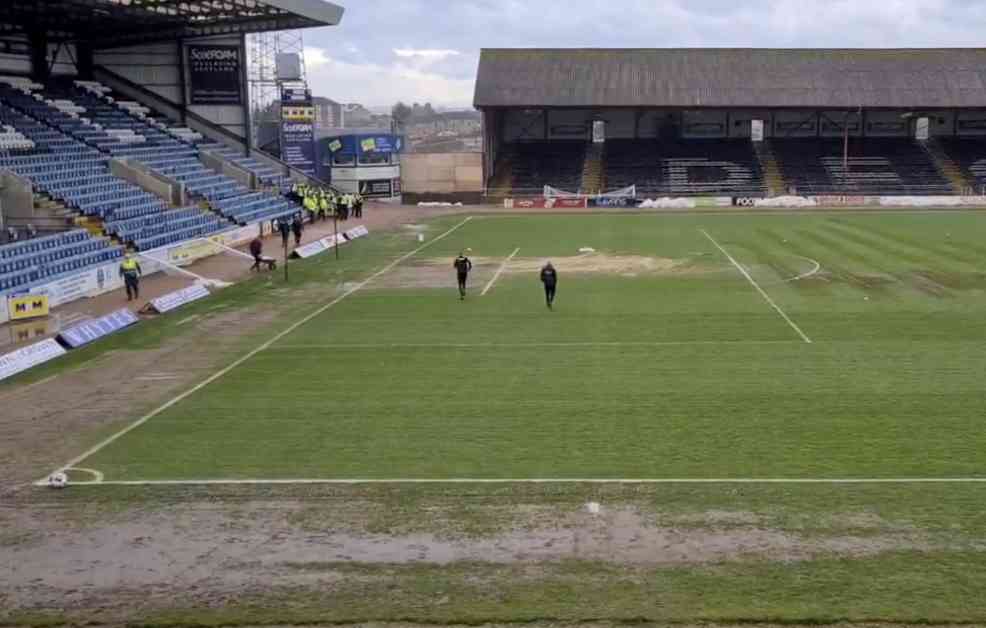Motherwell Raises Concerns Over Player Welfare at Dundee Pitch
Motherwell Football Club has expressed serious concerns about player safety at Dundee’s pitch ahead of their scheduled match at Dens Park. The decision to deem the pitch playable despite its questionable condition has raised alarms within the football community. The surface initially failed an 11am inspection, but was later passed at 1pm after referee David Dickenson conducted a further assessment.
Videos circulating from the ground depict various discoloured patches of grass and an overall low standard of the playing surface. The Steelmen have voiced their frustration at being forced to compete under such circumstances, highlighting profound worries about the grass’s suitability for elite football. The club took to social media to convey their apprehensions, stating, “Our match against Dundee will take place at 3pm this afternoon. We are deeply concerned for the welfare of all players ahead of this match due to concerns about the pitch.”
Player Welfare at the Forefront
The issue of player welfare in professional football has gained significant traction in recent years, with clubs, players, and governing bodies placing a greater emphasis on ensuring safe playing conditions. The physical demands of the sport require top-tier athletes to perform at their peak on surfaces that meet certain standards to prevent injuries and maintain the integrity of the game.
Motherwell’s stance on the condition of Dundee’s pitch reflects a broader concern for the well-being of all players involved in the match. While the decision to proceed with the game ultimately lies with the authorities, the club’s vocalization of their worries underscores the importance of prioritizing player safety above all else.
Impact on Performance and Injuries
The quality of the playing surface can have a direct impact on the performance of players and the likelihood of sustaining injuries during a match. A subpar pitch, riddled with uneven patches and poor grass coverage, can impede the fluidity of gameplay and increase the risk of slips, trips, and falls.
In elite football, where split-second decisions and precise movements are crucial, playing on an inadequate pitch can hamper a team’s ability to execute their strategies effectively. Furthermore, the potential for injuries rises significantly when players are forced to navigate unstable terrain, potentially leading to short-term setbacks or long-term health issues.
SPFL Approval and Accountability
The Scottish Professional Football League’s (SPFL) decision to approve Dundee’s pitch for the match raises questions about the accountability of governing bodies in ensuring safe playing conditions for all clubs. While referees play a crucial role in assessing the suitability of pitches, their judgments are ultimately subject to review and scrutiny by league officials.
The approval of a substandard pitch for competitive play not only jeopardizes the well-being of players but also calls into question the league’s commitment to upholding standards of professionalism and safety. Motherwell’s vocal objections to the condition of the pitch serve as a reminder of the responsibilities that organizations like the SPFL have in safeguarding the interests of all stakeholders in the sport.
Calls for Improved Pitch Maintenance
The incident at Dundee’s pitch underscores the need for enhanced pitch maintenance protocols across football clubs to prevent similar situations in the future. Regular inspections, adequate watering, and proper fertilization are essential practices to ensure that playing surfaces remain in optimal condition throughout the season.
Clubs must invest in quality turf management programs and work closely with groundskeeping professionals to address any issues that may arise with their pitches. By prioritizing pitch maintenance and upkeep, clubs can create a safe and conducive environment for players to perform at their best without compromising their well-being.
Looking Ahead: Ensuring Player Safety in Football
As the debate over player welfare in football continues to evolve, incidents like the one at Dundee’s pitch serve as a stark reminder of the challenges that clubs face in maintaining safe playing conditions. The onus is on governing bodies, clubs, and officials to collaborate and establish clear guidelines for pitch inspections, maintenance, and player safety protocols.
Motherwell’s outspoken concerns about the condition of the pitch at Dens Park highlight the need for greater transparency and accountability in ensuring that players are not put at unnecessary risk during matches. By prioritizing player welfare above all else, the football community can work towards creating a safer and more professional environment for athletes to showcase their talents without fear of injury or harm.
































